Plans Are Useless, But Planning is Indispensable

Eisenhower’s famous quote is quite a paradox. How does one reconcile this? Why do planning at all?
Tune in this week as Wayne reconciles the famous paradox and presents four ways in which planning is absolutely indispensable.
And please give us your thoughts in the comments section. Thank you.
Hello, this is Wayne Rivers at The Family Business Institute. Thanks for tuning in. As always, please click on our social media icons, we appreciate that. And let us have the benefit of your thinking in the comment section.
In our blog this week, I want to talk about Plans are Useless, But Planning is Indispensable. Okay, so why is this important?
This is a paradoxical statement. Plans are useless, but planning is indispensable. So, I want to explain the paradox and I want to present at least four unassailable reasons why planning works. So, let's get to that.
This is a quote from Dwight Eisenhower as president, or even I think, at the end of his presidency, he's reflecting back on his military career and he said in his experience plans are useless, but planning is indispensable. So, what did he mean by
that? Because even the best plans can't anticipate everything, right? I mean, emergencies by definition are things for which you didn't plan. The current world pandemic, none of us planned for it and it's certainly thrown a kink into how most of us do business. So, our plans are quite elaborate, and we've been doing them for 15 or 20 years, but nobody saw
this coming, I can tell you that. So, we've had to react and that may help explain the paradox. So, if planning is useless, if plans are useless but planning is indispensable, why plan at all?
I have a friend who before MMA was a real thing, he was in a quasi MMA fighting league and he said, "Yeah, that's absolutely true. But that's part of training. That's part of practicing. You will get popped in the mouth and only through practice and training will you know how to react and what to do in the event of a crisis like that. You can't talk about it,
you can't explain to somebody what it's like to feel physical pain from getting punched, so you have to go through it. You have to live through it through your training and practice so that your body and your brain will know how to react." And it makes perfect sense if you think about it that way. Can you imagine being in the current crisis without a plan? I mean,
where would you begin? How would you adjust and adapt? Is every day just a new hair on fire type of experience? I just can't even imagine what people are doing. So, I want to talk about the four benefits of planning that are easy for me to pick out. You can probably think of a few more.
The first thing is, again, back to Eisenhower, this is a quote, "The details of a plan which was designed years in advance are often incorrect, but the planning process demands the thorough exploration of options and contingencies. The knowledge gained during this probing is crucial to the selection of appropriate actions as future events unfold." Bingo,
that's why you do planning. Because you're gaining insight into yourself, your team, your business, et cetera, and you're learning how to plan so that when there is an emergency you can easily come back together and reformulate and recalibrate your plans.
Second point. Planning gives you a place to start. I can't even imagine how you'd work intelligently in the current situation without having a previous plan in place. It's much, much, much easier to adapt to changing circumstances if you already have a plan in place. Nobody would decide to drive from the East coast of the US to the West coast without a plan, without a map, without a route planned out. Sure, there might be detours and there might be places that you decide to go and see during the course, but you did start with a plan and you adapted the plan in little ways as you went along.
The third advantage of planning is it provides clarity, vision, and direction for your team. It aligns the people on your team.
I think Simon Sinek says, "It sets the image of the future." In the minds of the people on your team, and that's very valuable and that brings me to the fourth point. This is the most important point. It gives your team practice. Planning gives your team practice. Collaborating and working together, thinking together, challenging each other, requiring each other to defend ideas and things like that. It's the process of planning. It's not the the three inch, three ring binder filled with graphs and charts and diagrams and flow charts. It's not that. It's the process of planning that's valuable. It's the process of getting the best minds in your company together and planning as a team for good times and bad and for adjusting the plans as you go.
If you've never practiced planning together as a team, can you imagine how disjointed and ineffective it would be once you finally did? The irony of contractors, and contractors obviously is our biggest audience. The irony of contractors is
they don't do anything. They don't walk on a job site or turn a spade full of dirt without a comprehensive plan. And I've always found it ironic that the biggest project, the most important project of all that they have, is their business and they often in fact usually don't have overarching plans for their businesses. Now is the time when you need planning the most.
In times of unsettleness, that's when you need playing the most. And the good news is, it's never too late to start.
This is Wayne Rivers at The Family Business Institute. Thank you.


